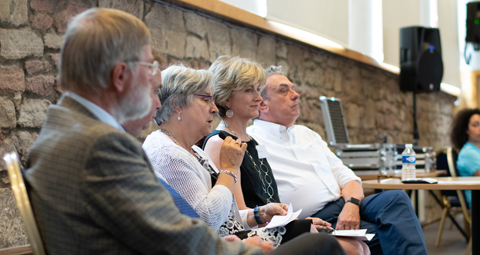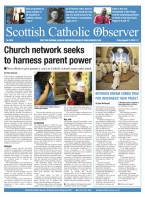June 28 | ![]() 0 COMMENTS
0 COMMENTS ![]() print
print

Coatbridge Life Issues Conference encourages Scots to ‘fight on’
By Michael MacIntosh
One Scot and three American speakers provided stimulating presentations at a landmark pro-life conference in St Augustine’s Parish, Coatbridge, on Saturday June 22.
Around 100 attendees had registered in advance for what organisers hope will be the inaugural Life Issues conference, this year titled ‘Building a Pro-Life Future.’
Gordon MacDonald, chief executive of Care Not Killing, and the only Scottish speaker on the day, gave a talk titled ‘Euthanasia: Will we see a change in the law for Scotland?’
Mr MacDonald explored the issue through parliamentary bills, court cases, non-prosecution of those who assist others to commit suicide, ‘institutional capture,’ the targeted infiltration of bodies such as the Royal College of Physicians, and media bias.
Adding an international context, he spoke about a case in Oregon, USA, where a woman was declined cancer treatment by her health insurance company who then offered to pay for her to be euthanised, and described the situation in Belgium where half of the nurses involved with euthanasia have killed without consent.
Mr MacDonald argued that the tactics of the assisted suicide lobby could be used against it, saying the movement has used ‘specious euphemisms’ to infiltrate public consciousness so that seemingly attractive and benevolent terms like ‘assisted dying,’ ‘compassion’ and ‘dignity’ have all been reduced to mean ‘helping someone to kill themselves.’
Those opposing euthanasia should reclaim the language by being clear that ‘assisted dying’ more correctly means hospice care rather than helping someone to kill themselves, Mr MacDonald argued.
American Austin Ruse (below left), author of Fake Science and Littlest Suffering Souls and the president of the Centre for Family and Human Rights, provided illuminating insights into the work undertaken by his organisation to counteract and expose the influence of treaty monitoring bodies within the United Nations who exert pressure on countries to implement policies antithetical to a pro-life culture.
Asked during the question and answer session what motivates the members of such bodies to pursue anti-family and anti-life goals, Mr Ruse said they are motivated by a sincere but false belief that no one will be free unless all sexual restrictions are broken down.
“God sent us, here, now, to fight these fights,” he said. “The Apostles weren’t the A-Team… it is left to us to fight the battle that has been presented to us. He sent us, right here, right now, when everything is so desperate, and I say that there are haloes hanging from the lowest branches of the trees.”
The afternoon speakers devoted much of their time to a topic which has gained a great deal of momentum in recent years in Scotland and internationally: transgenderism.
Cathy Ruse (above) senior fellow of the Family Research Council, delivered a stirring talk on gender theory. She characterised the ideology as ‘hypocritical’ and ‘mendacious’ and provided examples of the internal contradictions of the ideology and its negative effects, especially on young people whose normal adolescent identity crises are being exploited.
She argued that the vast majority of children that experience gender dysphoria make peace with their sex after puberty, meaning that a ‘watchful waiting’ approach would be the wisest choice for parents to adopt.
Instead, radical puberty-blocking drugs and surgeries are being promoted. Many times, underlying precipitating factors of the gender dysphoria, often trauma or abuse, go unacknowledged.
Fellow American Janet Smith’s talk, ‘How Misery Points the Way to God,’ managed to address difficult subjects in a light-hearted style.
She made palatable a discussion of the negative effects of society’s failure to heed the prophetic voice of Pope Paul VI’s encyclical Humanae Vitae, which in part addressed contraception.
“God didn’t just leave us to our own devices,” she said, outlining the scriptural route to understanding the truths of sexuality. She highlighted that the very first reference to a state of deprivation in Scripture is in Genesis 2:18, where God states ‘it is not good for man to be alone.’
From this verse the good of human sexuality can be inferred. This truth is supported further by Genesis 2:24, ‘therefore a man leaves his father and his mother and cleaves to his wife and they become one flesh’ and also Genesis 1:28: “Be fruitful and multiply and fill the Earth.”
“We’re not solitary individuals,” Prof Smith said, “and our culture tends to treat us as solitary individuals.”
She described some of the many ways in which the promised bounty of the sexual revolution has not only failed to materialise but has resulted in miserable consequences for those who have suffered through divorce, relationship instability and abortion.
Addressing how the Church should approach those with gender dysphoria, she said: “We’re meant to be those who carry the Cross for the people who suffer so badly. We need to walk with them, talk to them, be there for them. Not affirm them as transgender but affirm them as sons and daughters.”










